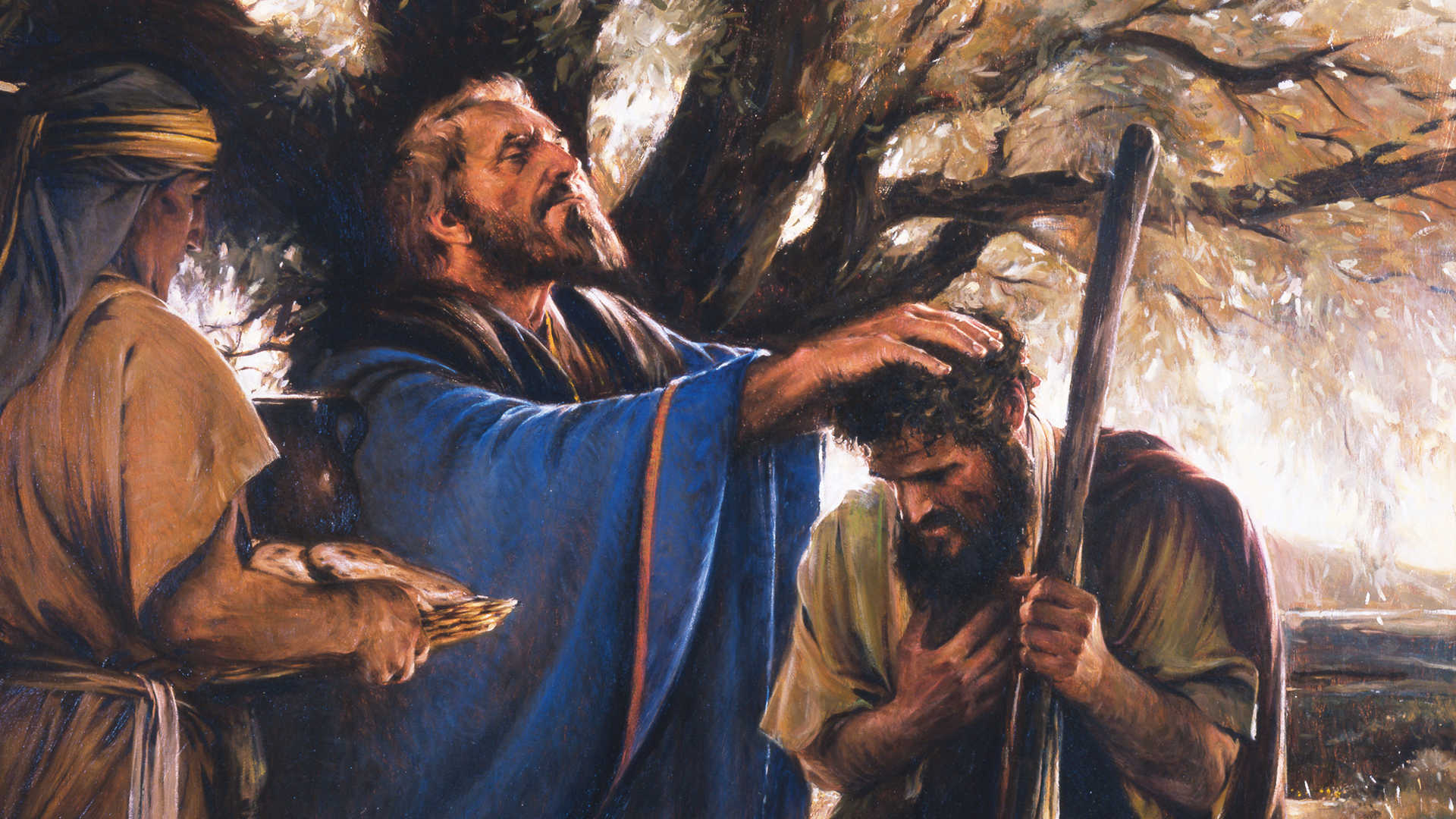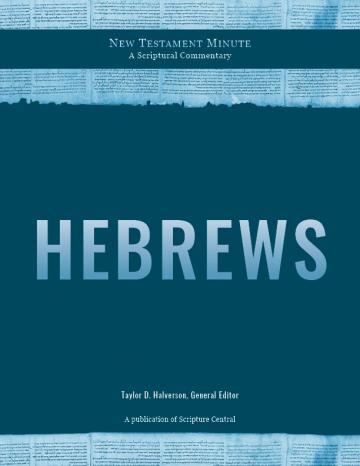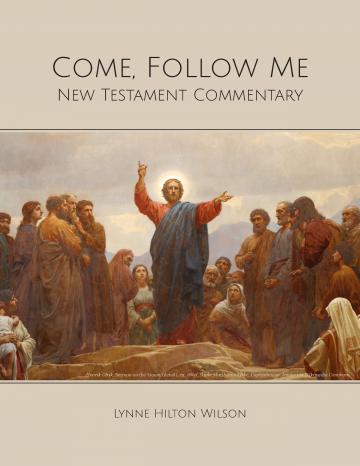You are here
Book of Mormon Central is in the process of migrating to our new Scripture Central website.
We ask for your patience during this transition. Over the coming weeks, all pages of bookofmormoncentral.org will be redirected to their corresponding page on scripturecentral.org, resulting in minimal disruption.

Hebrews 7–13
Scripture Central Videos
Watch videos from Gospel scholars and teachers to learn more about these New Testament passages. Scripture Central produces weekly videos from Tyler Griffin, Taylor Halverson, Clint Mortenson, John Hilton III, and Lynne Hilton Wilson.
Other Creator Videos
Commentary
The New Testament Minute is a commentary series made especially for the free ScripturePlus app, which features insights from New Testament scholars. many of the insights in the New Testament Minute are gleaned from the BYU New Testament Commentary series. Lynne Hilton Wilson has written a commentary to supplement her New Testament video series.
John W. Welch, General Editor
Reading Plan
Structure your personal scripture study by following a 15-minute, day-by-day plan. Each day's assignment includes the required scripture passages from the Come, Follow Me curriculum, as well as suggestions for additional resources to bring context and understanding to your study. For the best experience, use our Reading Plan in the free ScripturePlus app! You can track your progress and have access to the best resources.
Monday
- Verse of the Day: Hebrews 7:19
- Scripture: Hebrews 7:1-28
Tuesday
- Verse of the Day: Hebrews 8:10
- Scripture: Hebrews 8:1-13
- Scripture: Hebrews 9:1-14
- Video: Messages of Christ - Understanding the Day of Atonement or Yom Kippur
Wednesday
- Verse of the Day: Hebrews 10:16-17
- Scripture: Hebrews 9:15-28
- Scripture: Hebrews 10:1-18
- Commentary: Hebrews 10:1–4
- Commentary: Hebrews 10:5-9
- Commentary: Hebrews 10:11-18
Thursday
- Verse of the Day: Hebrews 10:36
- Scripture: Hebrews 10:19-39
- Video: Messages of Christ - The Tabernacle and the Messiah
- Commentary: Hebrews 10:34-35
-
Additional Study:
- Commentary: Hebrews 10:32-34
- Commentary: Hebrews 10:26-31
Friday
- Verse of the Day: Hebrews 11:1
- Scripture: Hebrews 11:1-40
- Commentary: Hebrews 11: Overview
- Commentary: Hebrews 11:1
- Commentary: Hebrews 11:3
- Commentary: Hebrews 11:5
- Commentary: Hebrews 11:8-22
-
Additional Study:
- Commentary: Hebrews 11:29-40
Saturday
- Verse of the Day: Hebrews 12:9
- Scripture: Hebrews 12:1-29
- Commentary: Hebrews 12:1
- Commentary: Hebrews 12:3
Sunday
- Verse of the Day: Hebrews 13:8
- Scripture: Hebrews 13:1-25
- Commentary: Hebrews 13: Overview
- Commentary: Hebrews 13:22
Joseph Smith Translation Variants
Explore Joseph Smith's inspired translation of the bible by comparing his changes to the King James Version of the New Testament. To learn more, see Joseph Smith's Translation of the Bible: The Joseph Smith Translation and the King James Translation in Parallel Columns.
Hebrews 7
|
KJV |
JST |
|
(3) Without father, without mother, without descent, having neither beginning of days, nor end of life; but made like unto the Son of God; abideth a priest continually. |
(3) For this Melchisedec was ordained a priest after the order of the Son of God, which order was without father, without mother, without descent, having neither beginning of days, nor end of life. And all those who are ordained unto this priesthood are made like unto the Son of God; abideth a priest continually. |
|
(19) For the law made nothing perfect, but the bringing in of a better hope did; by the which we draw nigh unto God. |
(19) For the Law was administered without an oath, and made nothing perfect, but was only the bringing in of a better hope |
|
(20) And inasmuch as not without an oath he was made priest: |
(20) Inasmuch as this high priest was not without an oath, |
|
(21–22) (For those priests were made without an oath; but this with an oath by him that said unto him, The Lord sware and will not repent, Thou art a priest for ever after the order of Melchisedec:) By so much was Jesus made a surety of a better testament. |
(21–22) By so much was Jesus madethesurety of a better testament. (For those priests were made without an oath; but this with an oath by him that said unto him, The Lord sware and will not repent, Thou art a priest for ever after the order of Melchisedec:) |
|
(26) For such an high priest became us, who is holy, harmless, undefiled, separate from sinners, and made higher than the heavens; |
(26) For such a high priest became us, who is holy, harmless, undefiled, separate from sinners, and made ruler over the heavens, |
|
(27) Who needeth not daily, as those high priests, to offer up sacrifice, first for his own sins, and then for the people’s: for this he did once, when he offered up himself. |
(27) And not as those high priests who offered up sacrifice daily—first for their own sins and then for the sins of the people. For he needeth not offer sacrifice for his own sins, for he knew no sins, but for the sins of the people. And this he did once, when he offered up himself. |
Hebrews 8
|
KJV |
JST |
|
(4) For if he were on earth, he should not be a priest, seeing that there are priests that offer gifts according to the law: |
(4) Therefore, while he was on the earth, he offered for a sacrifice his own life for the sins of the people. Now every priest under the Law must needs offer gifts or sacrifices according to the Law. |
Hebrews 9
|
KJV |
JST |
|
(8) The Holy Ghost this signifying, that the way into the holiest of all was not yet made manifest, while as the first tabernacle was yet standing: |
(8) The Holy Ghost signifying this, that the way into the holiest of all was not yet made manifest, while as yet the first tabernacle was standing, |
|
(10) Which stood only in meats and drinks, and divers washings, and carnal ordinances, imposed on them until the time of reformation. |
(10) Which consisted only in meats and drinks, and divers washings, and carnal ordinances, imposed on them until the time of reformation. |
|
(15) And for this cause he is the mediator of the new testament, that by means of death, for the redemption of the transgressions that were under the first testament, they which are called might receive the promise of eternal inheritance. |
(15) And for this cause he is the mediator of the new covenant, that by means of death, for the redemption of the transgressions that were under the first covenant, they which are called might receive the promise of eternal inheritance. |
|
(16) For where a testament is, there must also of necessity be the death of the testator. |
(16) For where a covenant is, there must also of necessity be the death of the victim. |
|
(17) For a testament is of force after men are dead: otherwise it is of no strength at all while the testator liveth. |
(17) For a covenant is of force after the victim is dead: otherwise it is of no strength at all while the victim liveth. |
|
(18) Whereupon neither the first testament was dedicated without blood. |
(18) Whereupon neither the first covenant was dedicated without blood. |
|
(20) Saying, This is the blood of the testament which God hath enjoined unto you. |
(20) Saying, This is the blood of the covenant which God hath enjoined unto you. |
|
(26) For then must he often have suffered since the foundation of the world: but now once in the end of the world hath he appeared to put away sin by the sacrifice of himself. |
(26) For then must he often have suffered since the foundation of the world: but now once in the meridian of time hath he appeared to put away sin by the sacrifice of himself. |
|
(28) So Christ was once offered to bear the sins of many; and unto them that look for him shall he appear the second time without sin unto salvation. |
(28) So Christ was once offered to bear the sins of many, and he shall appear the second time without sin unto salvation unto them that look for him. |
Hebrews 10
|
KJV |
JST |
|
(1) For the law having a shadow of good things to come, and not the very image of the things, can never with those sacrifices which they offered year by year continually make the comers thereunto perfect. |
(1) For the law having a shadow of good things to come, and not the very image of the things, can never with those sacrifices which they offered continually year by year make the comers thereunto perfect. |
|
(10) By the which will we are sanctified through the offering of the body of Jesus Christ once for all. |
(10) By |
|
(13) From henceforth expecting till his enemies be made his footstool. |
(13) From henceforth to reign until his enemies be made his footstool. |
|
(21) And having an high priest over the house of God; |
(21) And having such an high priest over the house of God, |
Hebrews 11
|
KJV |
JST |
|
(1) Now faith is the substance of things hoped for, the evidence of things not seen. |
(1) Now faith is the assurance of things hoped for, the evidence of things not seen. |
|
(12) Therefore sprang there even of one, and him as good as dead, so many as the stars of the sky in multitude, and as the sand which is by the sea shore innumerable. |
(12) Therefore sprang there even of one, and him as good as dead, as many as the stars of the sky in multitude, and as the sand which is by the sea shore innumerable. |
|
(23) By faith Moses, when he was born, was hid three months of his parents, because they saw he was a proper child; and they were not afraid of the king’s commandment. |
(23) By faith Moses, when he was born, was hid three months of his parents, because they saw he was that peculiar child; and they were not afraid of the king’s commandment. |
|
(24) By faith Moses, when he was come to years, refused to be called the son of Pharaoh’s daughter; |
(24) By faith Moses, when he was come to years of discretion, refused to be called the son of Pharaoh’s daughter; |
|
(32) And what shall I more say? for the time would fail me to tell of Gedeon, and of Barak, and of Samson, and of Jephthae; of David also, and Samuel, and of the prophets: |
(32) And what shall I say more? For the time would fail me to tell of Gedeon, and of Barak, and of Samson, and of Jephthae; of David also, and Samuel, and of the prophets: |
|
(35) Women received their dead raised to life again: and others were tortured, not accepting deliverance; that they might obtain a better resurrection: |
(35) Women received their dead raised to life again: and others were tortured, not accepting deliverance; that they might obtain the first resurrection. |
|
(39) And these all, having obtained a good report through faith, received not the promise: |
(39) And these all, having obtained a good report through faith, received not the promises, |
|
(40) God having provided some better thing for us, that they without us should not be made perfect. |
(40) God having provided some better things for them through their sufferings. For without sufferings they could not be made perfect. |
Hebrews 12
|
KJV |
JST |
|
(12) Wherefore lift up the hands which hang down, and the feeble knees; |
(12) Wherefore lift up the hands which hang down, and strengthen the feeble knees. |
|
(28) Wherefore we receiving a kingdom which cannot be moved, let us have grace, whereby we may serve God acceptably with reverence and godly fear: |
(28) Wherefore we, receiving a kingdom which cannot be moved, should have grace whereby we may serve God acceptably with reverence and godly fear: |
Hebrews 13
|
KJV |
JST |
|
(3) Remember them that are in bonds, as bound with them; and them which suffer adversity, as being yourselves also in the body. |
(3) Remember them that are in bonds, as bound with them; and them which suffer adversity, as being yourselves also of the body. |
|
(5) Let your conversation be without covetousness; and be content with such things as ye have: for he hath said, I will never leave thee, nor forsake thee. |
(5) Let your consecrations be without covetousness; and be content with giving such things as ye have: for he hath said, I will never leave thee, nor forsake thee. |
Reading Resources
Hebrews 7–13
Lynne Hilton Wilson, "Hebrews 7-13," Come Follow Me: The New Testament, 2019.
John Hilton III. "Teaching the Scriptural Emphasis on the Crucifixion of Jesus Christ." Religious Educator, 20 (3): 133-153 (2019).
Jesus as the Great High Priest:
- Donald W. Parry, “Ancient Sacred Vestments: Scriptural Symbols and Meanings,” Interpreter: A Journal of Latter-day Saint Faith and Scholarship 48 (2021): 11–32.
- Richard D. Draper, “‘By His Own Blood He Entered in Once into the Holy Place’: Jesus in Hebrews 9” in Thou Art the Christ: The Son of the Living God, The Person and Work of Jesus in the New Testament, ed. Eric D. Huntsman, Lincoln H. Blumell, and Tyler J. Griffin (Religious Studies Center, Brigham Young University; Salt Lake City: Deseret Book, 2018), 216–243.
- John S. Tanner, “Christ, Our Advocate and High Priest,” Religious Educator 8, no. 2 (2007): 26–34
Melchizedek Priesthood:
- Frank F. Judd Jr., “Melchizedek: Seeing After the Zion of Enoch” in Sperry Symposium Classics: The Old Testament, ed. Paul Y. Hoskisson (Provo and Salt Lake City: Religious Studies Center, Brigham Young University, and Deseret Book 2005), 69–82.
- “Question: Was the priesthood held by Jesus priesthood not 'transferable' to members of the Church?” FairMormon.org.
- Robert L. Millet, “Prophets and Priesthood in the Old Testament,” in Sperry Symposium Classics: The Old Testament, ed. Paul Y. Hoskisson (Provo and Salt Lake City: Religious Studies Center, Brigham Young University, and Deseret Book 2005), 48–68
- Robert L. Millet, “The Holy Order of God,” in The Book of Mormon: Alma, The Testimony of the Word, eds. Monte S. Nyman and Charles D. Tate Jr., (Provo, Utah: Religious Studies Center, Brigham Young University, 1992), 61–88.
Faith, the Act of Trusting God
- Jeffrey W. Carter, "Belief in a Promise: The Power of Faith," Religious Educator 13, no. 3 (2012): 173–187.
- David A. Bednar, “Seek Learning by Faith,” Liahona, September 2007























